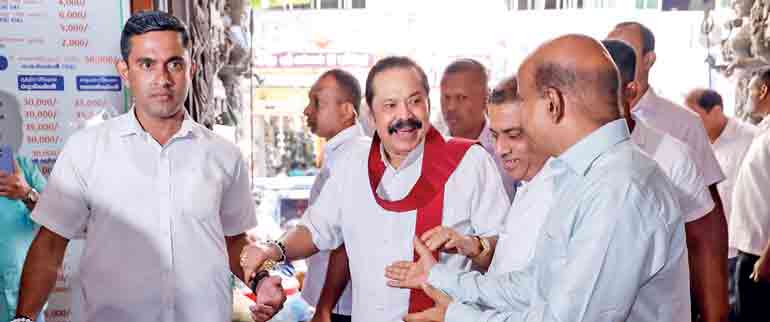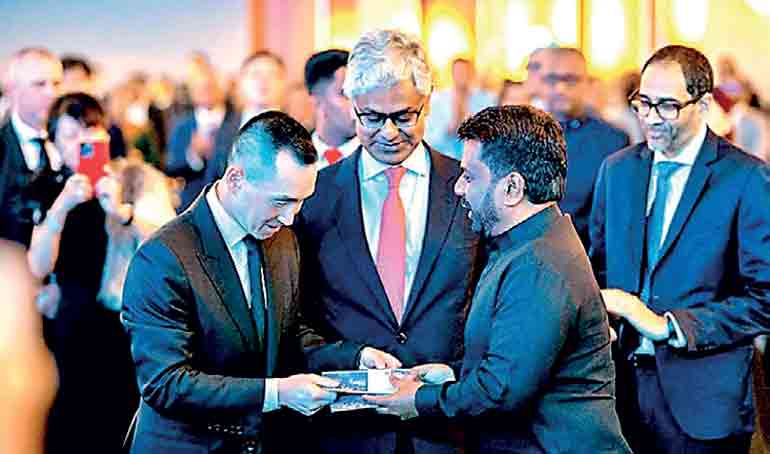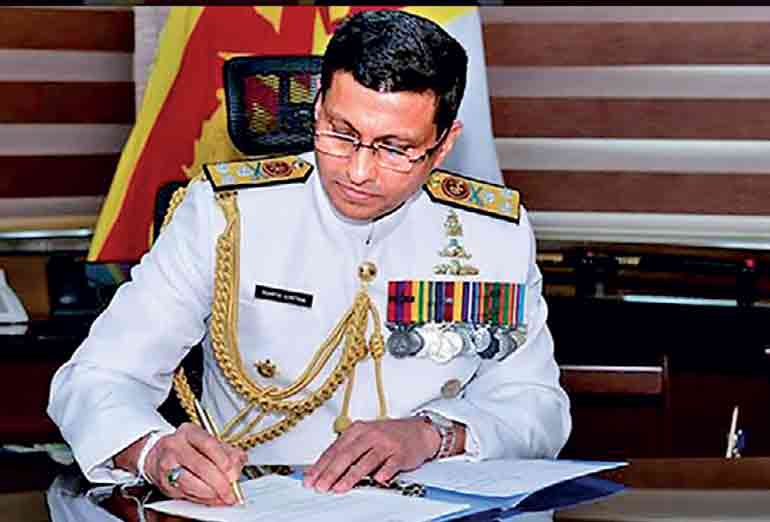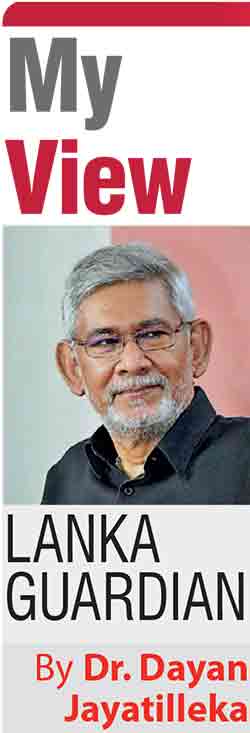Sunday Feb 22, 2026
Sunday Feb 22, 2026
Thursday, 7 August 2025 02:50 - - {{hitsCtrl.values.hits}}

Evicting Mahinda: Is it prudent?

Is AKD Sri Lanka’s Yeltsin?

Ex-Navy Commander, Admiral Ulugetenne, remanded
 An authentically non-elitist leader who broke the caste-class barrier in 1988, President Ranasinghe Premadasa, (AKD doesn’t meet the first criterion), together with his elitist minister Ranjan Wijeratne, literally smashed the Colombo empire of casino king Joe Sim. Now, under Anura Dissanayake’s presidency and in his presence, Lawrence Ho, a Hong Kong born Canadian and CEO of Melco, recommends that Sri Lanka be to India what Macau is to China, and indicates that is our goal and trajectory. (https://www.dailymirror.lk/business-news/SL-poised-to-become-Indias-Macau-says-Melco-chief-at-JKHs-City-of-Dreams-launch/273-315867)
An authentically non-elitist leader who broke the caste-class barrier in 1988, President Ranasinghe Premadasa, (AKD doesn’t meet the first criterion), together with his elitist minister Ranjan Wijeratne, literally smashed the Colombo empire of casino king Joe Sim. Now, under Anura Dissanayake’s presidency and in his presence, Lawrence Ho, a Hong Kong born Canadian and CEO of Melco, recommends that Sri Lanka be to India what Macau is to China, and indicates that is our goal and trajectory. (https://www.dailymirror.lk/business-news/SL-poised-to-become-Indias-Macau-says-Melco-chief-at-JKHs-City-of-Dreams-launch/273-315867)
India’s Macau
Mr Ho should stick to the excellent investment he has made in the outstanding JKH project the City of Dreams, and not provide gratuitous advice to countries about what they can or should be. He’s a very successful businessman, not a thinker of any repute—unlike Kishore Mahbubani who has just given us far better advice. (https://www.ft.lk/top-story/With-biggest-markets-at-doorstep-Sri-Lanka-in-a-sweet-spot-KishoreMahbubani/26-779899)
A country is not a company, let alone a casino. Not only is Macau a gambling/gaming hub, it is also an autonomous administrative region of China, which is natural because it was a Portuguese colony seized from China which reverted to Chinese sovereignty. Does Lawrence Ho recommend we become an administrative region of India? Is that what we are actually becoming under AKD?
Gambling hubs run counter to this island’s multireligious ethos. They also attract criminality. Sri Lanka doesn’t have anything like China’s ability to crush criminality let alone cartels. On AKD’s watch there’ve been an unprecedented 76 shootings this year so far.
Instead, we shall become like pre-revolutionary Cuba, a gambler’s paradise for Mafiosi from Florida, across 90 miles of water. Players will flood Colombo from Chennai. In Cuba too, a once-elected, subsequently despotic, non-elitist son of impoverished farmers was ruler: Fulgencio Batista.
But there could be an upside. Remember The Godfather II (1973) and Havana (1990) with Robert Redford? The casinos which proliferated with Batista’s blessings, the foreign gamblers and corrupt lifestyle of Cuba’s parasitic high-society, catalysed Fidel Castro’s revolution. Jesuit-educated lawyer Fidel set fire to the large sugar plantations owned by his father.
Non-elite Govt., pro-elite policy
When the NPP boasted of its non-elite (‘nir-prabhoo’) character and promised a new political culture, public expectation was of a progressive improvement. But there has been no policy tilt in economics away from the elite and in favour of the non-elite, as there was under President Premadasa (‘Janasaviya’). The ODI-CEPA reports notes an increase in poverty under AKD, back to the early 2000s and twice that of 2021. In absolute terms it gives the numbers at 7 million to 10 million. If it is 10 million, then roughly half of Sri Lanka’s citizens are poor. If you take the lower figure of 7 million, that means one-third of them are poor. On the other hand, the profits raked in by the top corporates have increased in the first quarter of this year. No wonder Malik Samarawickrama heartily applauds.
A pinpoint of light can be glimpsed at the end of the JVP-NPP economic tunnel with Sajith Premadasa naming the late Rienzie Wijetilleke’s son Kusum Wijetilleke, a young progressive-centrist highly literate in contemporary economic discourse, as Special Advisor on Political Economy to the Leader of the Opposition.
Persecuting elderly leaders
The ‘non-elite’ NPP administration is certainly on overdrive against the old political elite. Young Namal Rajapaksa has cases against him revived and Sajith Premadasa has a commission headed by a retired judge investigating him over the Central Cultural Fund.
The NPP is coiled to strike at the surviving ex-presidents through revocation of the 1986 legislation and the deprivation of the residences, security details, allowances and secretarial staffs permitted those former leaders. This is both bad and ugly.
 It is the wrong priority and the wrong timing.
It is the wrong priority and the wrong timing.
 The legislation should have pertained to future leaders, not previous ones.
The legislation should have pertained to future leaders, not previous ones.
 Insofar as the legislation entails deprivation of something that has not been grabbed illegally but afforded through proper Constitutional procedure, that impending deprival smacks of viciousness and petty-mindedness.
Insofar as the legislation entails deprivation of something that has not been grabbed illegally but afforded through proper Constitutional procedure, that impending deprival smacks of viciousness and petty-mindedness.
 Insofar as it concerns leaders who played a greater or lesser role in wartime, and one widow of an assassinated leader, the NPP move exhibits an ungenerous spirit.
Insofar as it concerns leaders who played a greater or lesser role in wartime, and one widow of an assassinated leader, the NPP move exhibits an ungenerous spirit.
 If public expenditure was extravagantly unaffordable today, the answer should be to impose spending limits, parameters.
If public expenditure was extravagantly unaffordable today, the answer should be to impose spending limits, parameters.
 In that Mahinda Rajapaksa, the former president who led us to victory, ending a thirty years war in three years and ushering in the peace we now enjoy, will be deprived of his official residence in Colombo, it displays the resentment of those who have recorded no dramatic positive achievement, towards a hero whose contribution will be indelibly recorded in the continuous chronicles of our long history.
In that Mahinda Rajapaksa, the former president who led us to victory, ending a thirty years war in three years and ushering in the peace we now enjoy, will be deprived of his official residence in Colombo, it displays the resentment of those who have recorded no dramatic positive achievement, towards a hero whose contribution will be indelibly recorded in the continuous chronicles of our long history.
This move makes President Anura Dissanayake, a young leader of no heroic, historic achievement so far, seem utterly ungrateful, ungracious and downright disrespectful towards an elder in the last stages of his life-- a larger figure; a leader who risked violent death, visited the frontline troops in wartime, politically rallied and led the nation in defeating a formidable and terrible enemy, thus saving his country.
Rancour and resentment
What has been proved so far is that AKD and the JVP-NPP are not driven by an advanced class consciousness as most Marxists, revolutionaries, socialists and leftists are, but precisely by that which Friedrich Nietzsche strenuously warned against as an unheroic weakness originating in the ‘non-elite’: ‘ressentiment’, which is the French term (and his preferred usage) for resentment.
The firewall between ‘class consciousness’ and ‘social resentment’, is something that the JVP from Rohana Wijeweera to Anura Dissanayake never grasped.
The absence of an advanced class standpoint/perspective has made AKD-NPP obediently sign secret agreements with Modi’s India which grant Indian preponderance over Trincomalee; render Sri Lanka energy-dependent on South India; have a visa-free policy towards Israelis, many of whom exhibit pro-genocide militarist sentiments while here; openly capitulate to the IMF, foreign private creditors, and local big business; ride roughshod over the sugar-cane cultivators of Sevanagala and Pelwatte and serve eviction notices on the farmers of Muttu Nagar in Trincomalee.
A surplus of social resentment has made the JVP-NPP capitulate to the local elite and any passing foreign patron, as agency of upward social mobility. Social resentment also motivates the drives to persecute aged members of the old governing elite, witch-hunt the war-winning military officer-corps, and scapegoat the state administrators.
JVP vs. Military, Round 3?
In any normal democratic state, under a civilized government, a former commander of one of the three main branches of the armed forces is never arrested by the CID and swiftly consigned to remand prison. This is what has befallen (Retd) Admiral Nishantha Ulugetenne, former commander of the Sri Lankan Navy.
Nationalist civic activist Jihan Hameed, whom I remember from two decades back as a keenly inquiring postgraduate student of international relations at the University of Colombo’s Faculty of Graduate Studies, has addressed a critique to the Ministry of Defence (MoD) about the process of Admiral Ulugetenne’s arrest and incarceration. She argues that though the former commander is no longer in uniform it neither means he is completely outside the parametric protocols of civil-military relations, nor precludes an intermediate, transitional or oversight role for the MoD.
‘…While the judiciary may act independently, the Ministry of Defence bears the non-transferable responsibility to advise, intervene, and preserve the command dignity of the armed forces, especially in cases involving former service commanders.
The Sri Lanka Navy Act (Cap. 358) and the broader defence legal framework provide clear avenues for lawful detention and inquiry of serving and former officers, including:
 Military custody under naval or tri-force supervision
Military custody under naval or tri-force supervision
 Board of Inquiry (BOI) or service-based fact-finding prior to criminal process
Board of Inquiry (BOI) or service-based fact-finding prior to criminal process
 Defence Ministry oversight in civil–military interface during legal action
Defence Ministry oversight in civil–military interface during legal action
 Special status considerations for former Commanders under protocol
Special status considerations for former Commanders under protocol
In this instance, the complete failure to invoke or recommend such protections has resulted in:
1.A breach of military law and standard procedure, particularly Sections 109–120 of the Navy Act.
2.A collapse in civil-military administrative coordination, led by your Ministry.
3.A violation of Article 12(1) of the Constitution, where equal protection of the law is denied through selective targeting.
4.A national-level humiliation of the highest wartime naval authority, sending an irreparable message to current and future commanders of all tri-services.
There is no precedent in Sri Lanka’s modern history for a former Commander of a military branch to be remanded in this manner without conviction. There is, however, precedent for internal military investigation, dignified inquiry, and state oversight — all of which have been abandoned in this case…
1.Was the Ministry of Defence consulted or notified prior to the arrest and remand of the former Navy Commander?
2.Did the Ministry propose, request, or evaluate military custody under the Sri Lanka Navy or Joint Operations Command?
3.Did the Navy initiate a Board of Inquiry or recommend alternative protocol-based actions in line with its command statutes?
4.What established procedures exist for the handling of legal action against former Commanders of the tri-forces, and were they followed?
5.Does the Ministry accept that it has failed in its statutory and institutional duty to prevent this breach of military dignity?
…This is a direct assault on the symbolic and constitutional standing of the Sri Lankan armed forces. The remanding of a former Navy Commander without military oversight constitutes a state-level institutional failure for which the Ministry must now be held accountable…’ (https://www.ft.lk/opinion/Letter-of-concern-to-Defence-Secretary-over-arrest-of-former-Navy-Chief/14-779697)
 |
| Jihan Hameed, nationalist activist, protests to MoD on Ulugetenne arrest |
Abnormal administration
My own objections are more to do with codes of conduct and behavioural norms, of propriety and institutional civility, which seem alien to AKD and the JVP-NPP.
In no normal, civilized democratic state are matters handled in the manner that the Ulugetenne affair has been. Usually, the CID would interview the retired service chief at his residence, record a statement, and refer the matter to the Ministry of Justice and the A-G’s Department which would examine whether or not there is a sufficient cause for immediate arrest and detention, and sufficient evidence to take the case to trial and obtain a conviction. If there is, house arrest would be the more civilized option for a former commander of the Navy.
Under the AKD administration, former members of the Sri Lankan military’s officer corps are being treated as if we are living in a country with a history of military rule, which has now liberated itself from it and made a transition to democracy. Our wartime military officers are being treated as if they were members of a military junta, which of course they weren’t. At all times, throughout the Thirty Years War, Sri Lanka remained under elected civilian leaders and administrations. The military operated under those elected leaders. Never did the military attempt to seize power. It is the military that secured the environment even during decades of intense war, for competitive democratic elections at every level of the political structure—and always abided by their outcomes.
Why then are they, especially those officers who were in frontline combat roles, being treated as shabbily and with suspicion, as they are currently?
Things will be even more abnormal when an Independent Prosecutor’s Office with a Special Prosecutor is appointed, and the wartime combat commanders at various operational levels hauled up before it as suspects if not criminals on the skimpiest of evidence or on complaints from the most questionable of sources.
The Ulugetenne arrest and detention should be seen against the backdrop of President Anura Kumara Dissanayake’s May 18th speech at the War Memorial this year, in which he never acknowledged the defeat by the Sri Lankan military of the Tigers as a victory. He never celebrated or even commended it.
While the President himself has not acknowledged the necessary and just character of the war of self-defence and national-territorial reunification, the arrest and incarceration of the former Commander of the Navy on a charge concerning the alleged disappearance of two youths earlier in his career (as Director/Naval Intelligence), projects a slanted, negative view of the entire war.
Given its actions, the NPP Government’s targets—intentional or not—seem twofold:
The JVP fought the Sri Lankan state with the military as its core, twice, and lost. It doesn’t seem to have forgiven the state and military which won. The JVP-NPP is latently hostile to the Sri Lankan state as a whole, hence the campaign of villainization, targeting civilian administrative officials as a stratum, an apparatus, while adopting towards the military, a strategy of perforation, disruption and de-construction from above.
 |
| Lawrence Ho: Sri Lanka can be India’s Macau |
Anura as Boris Yeltsin
The West will be motivated to divert attention from Israel’s genocidal war on Gaza, by shifting the human rights searchlight to Sri Lanka’s past. Our country faces a long-term threat of the Diaspora-driven, electorally-motivated and Western-propelled delegitimization of our war of self-defence and its victorious outcome. Hence the Western-funded criminalization of our wartime military and political leadership by levelling aspersions at our state and its ‘system-wide’ conduct of the war, through the Darusman Report and the UN Human Rights High Commissioner’s Office.
The AKD administration is wittingly or unwittingly demoralizing and destabilizing the Sri Lankan military’s wartime officer corps, especially the Navy, precisely as it is about to hand Trincomalee-Manner over to India as a ‘hub’; evict farming communities in favour of foreign corporates; and give Indian corporates the contract to produce and exercise considerable control over Sri Lanka’s Digital Identity Cards.
The Government is subverting the spirit and capacity of patriotic resistance of the Sri Lankan military and the nation-state so they will no longer be able to countervail external encroachment.
The Soviet state which crushed the Nazi fascists, disintegrated without a shot being fired, due to the well-intentioned but reckless reforms of Mikhail Gorbachev followed by the shameful selloffs and sell-out by Boris Yeltsin—both former Communists. AKD’s NPP administration is doing to the Sri Lankan state what Yeltsin did to the Soviet state.
Subversion by salami tactics
The JVP-NPP is using what was called ‘salami tactics’ during the Cold War: takeover of the State, not in one go as in the aftermath of a revolution, but slice by slice; chipping away at the established state, whittling it down, dismantling it, while taking control by incrementally installing their own cadres at all possible levels. The JVP-NPP strives to subvert the non-party character and content of the state machine.
Already, spirited young people have been walking out at various meetings of youth clubs under the umbrella of the National Youth Services Council (NYSCO), in protest against the overt, intrusive presence of JVP-NPP politicians and alleged attempts to tweak the electoral process, stuffing posts with unsuccessful JVP-NPP candidates or their offspring. NPP politicians openly declare that they do not feel bound by existing procedures and conventions of non-partisanship.
Sajith Premadasa and Namal Rajapaksa have excoriated the JVP-NPP attempt to politicize in a partisan fashion, quasi-autonomous youth and civic organizations. But they’ve not yet named the JVP-NPP project for what it is: totalitarianism.
(Visit: https://dayanjayatilleka.webflow.io/http://Visit: https://dayanjayatilleka.webflow.io/)